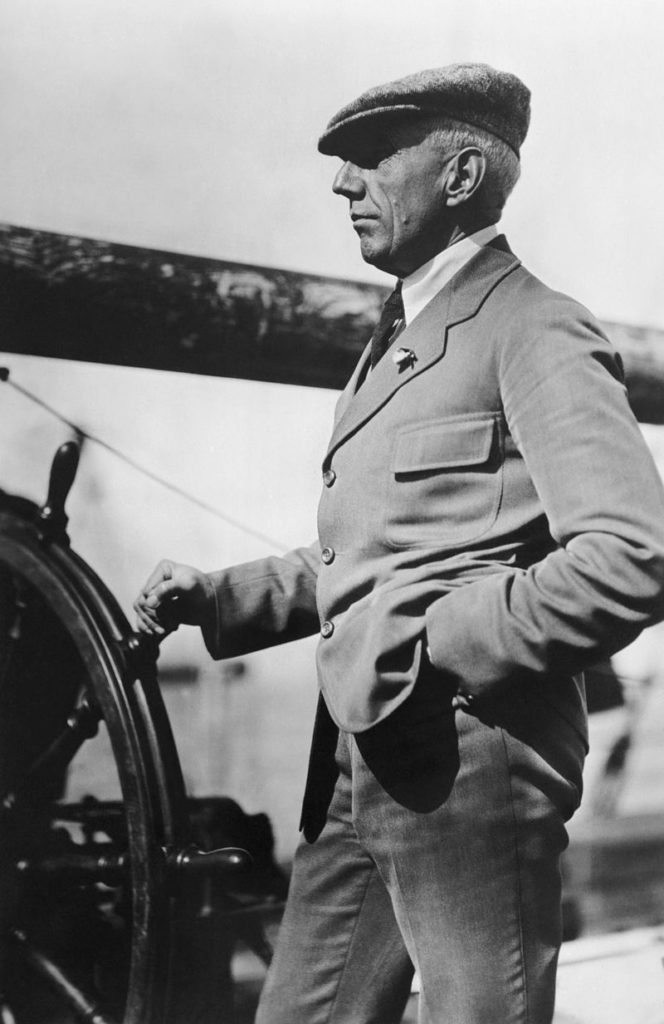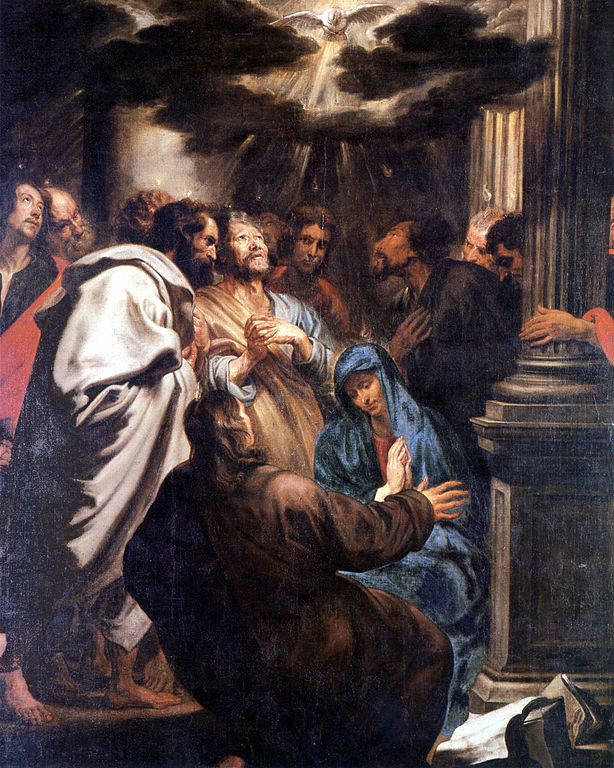This article is by Santiago Lange, one of GCI’s pastors in Germany.

A story is told about the great Norwegian explorer Roald Amundsen (pictured at right), the first person to discover the magnetic meridian of the North Pole and to discover the South Pole. On one of his journeys, Amundsen took a homing pigeon with him. When he had finally reached the top of the world, he opened the bird’s cage and set it free. Imagine the joy of Amundsen’s wife, back in Norway, when she looked up from the doorway of her home and saw the pigeon circling in the sky above. No doubt she exclaimed, “He’s alive!”
Empowered for mission
So it was when Jesus’ disciples first encountered the risen Lord. And though they were sad when he ascended to heaven, they clung to Jesus’ promise that he would send them “another Comforter” (John 14:16, KJV). What joy, then, when the Spirit descended upon them at Pentecost. The disciples were given a powerful, continual reminder that Jesus was alive and victorious.
It’s the same for us today. Jesus is alive and at work, empowering us by his Spirit to fulfill the mission he gave us to “make disciples” (Matt. 28:18-20). Concerning the Spirit’s central role in that mission, John Stott wrote this:
Without the Holy Spirit, Christian discipleship would be inconceivable, even impossible. There can be no life without the life-giver, no understanding without the Spirit of Truth, no fellowship without the unity of the Spirit, no Christlikeness of character apart from his fruit, and no effective witness without his power. As a body without breath is a corpse, so the church without the Spirit is dead.
Following the lead of the Spirit in fulfilling Jesus’ Great Commission involves church growth, but what direction should that growth take? Some say the church should focus on growing upward—reaching up to God in worship. Others say the church should focus on growing inward—reaching in to help the church become a more loving community. Still others say the church should focus on growing outward—reaching out to help unbelievers develop a relationship with Jesus. So which is it? Should our focus as a church be on reaching up, or in, our out? When we examine the priorities and methods of the early church, we see that they were led by the Spirit to focus on all three:
And they continued steadfastly in the apostles’ doctrine and fellowship, and in breaking of bread, and in prayers. And fear came upon every soul: and many wonders and signs were done by the apostles. And all that believed were together and had all things common; And sold their possessions and goods, and parted them to all men, as every man had need. And they, continuing daily with one accord in the temple, and breaking bread from house to house, did eat their meat with gladness and singleness of heart, Praising God, and having favor with all the people. And the Lord added to the church daily such as should be saved. (Acts 2:42-47, KJV)

(public domain via Wikimedia) Commons)
We may wonder if it’s fair to examine the growth of the church immediately after the Holy Spirit was poured out on the day of Pentecost. Wasn’t the key to its growth the power of the Spirit rather than the activities of the church? The answer is that the growth they experienced involved both. Yes, these first Christians depended upon the power of the Holy Spirit to produce the growth, but they also were active participants with the Spirit in bringing about that growth. The same applies in the church today. The power of God is available to us, but we need to let that power flow through us.
The church grew upward
On that day of Pentecost, the power of the Holy Spirit came upon the assembled followers of Jesus. Due to their Spirit-empowered efforts, including Peter’s proclamation of the gospel of Jesus Christ, 3,000 people were converted and baptized. This newly-formed church then devoted itself to worshiping God through receiving the Apostles’ teaching, breaking bread (sharing the Lord’s Supper) and in prayer. As a result, “fear” came upon that group—not fear of other people, but reverence for the Lord as they acknowledged God’s mighty power and their utter dependence upon him.
When it comes to church growth (both qualitatively and quantitatively), this upwardly-focused worship of God is first priority. As we grow in our communion with God, in Christ, by the Spirit, we become walking, talking advertisements to the world around us of the goodness and glory of God. As people see our desire to worship God, we become signs that point people to Jesus Christ.
The church grew inward
In Acts 2, we are told that the followers of Jesus were “together,” experiencing a profound sense of “fellowship.” That fellowship included sharing their material possessions with each other, as well as worshiping together. Today, as we come together in mutual care and worship, we do so as brothers and sisters in Christ. Our reaching up to God in worship should lead to growth in oneness as a community. Jesus tells us that our relationship with him cannot be separated from our relationship with each other. In John 13:34, he gave us a “new commandment” that we are to love each other in the way he loves us. As we obey, the church grows inwardly.
The church grew outward
The Holy Spirit led the Acts 2 church to begin reaching out to those around them with words and actions that proclaimed the gospel of Jesus Christ. When Peter and John went to the temple to pray, they encountered a lame man who interrupted them, asking for alms. Didn’t this cripple realize he was interrupting two leaders of an exciting, growing church? Surely, they were too busy to listen to him! Well, they were not. Not only did they stop, they reached out to the lame man in a personal, caring way. Then, without asking him to confess his faith in Jesus or to commit himself to the church, they told him to get up and walk. Watching all this was a crowd of people, giving Peter opportunity to proclaim the gospel verbally. Many in the crowd believed, and the church grew in numbers.
When we come across those outside the church who need our help, we too are to reach out—not because it’s expected of us, not merely as a method to grow the church, but simply because we care. As we then let people know that what we are doing is for the sake of Jesus who loves and cares for them, we will be glorifying him. The Holy Spirit empowers us for this work of evangelism—expressing Jesus’ love and concern for others through our caring actions and words. That sort of outreach, done in Jesus’ name and by his power, often leads to church growth.
How should we view church growth?
Unfortunately, some shy away from the idea of church growth, seeing it as a worldly endeavor. Some it’s like a club conducting a membership drive. Well, if our motive is merely numerical growth, there is a problem. But when our motive is to glorify God, focusing on church growth (in the ways we’ve looked at here) becomes genuine participation in Jesus’ disciple-making ministry—helping others come into a growing relationship with their Lord and Savior.
Because the church of Acts 2 actively reached up, in, and out, its members became passionate worshippers of God, the church became a loving community, and through outreach the church increased in numbers. Our challenge today is to follow their example, and to be committed and united in doing so.
Though we sometimes feel inadequate to meet the challenge of church growth, we don’t need to feel that way. God is the one who provides the growth. Our part is to cultivate the soil where God sends us, plant the seeds that God provides, and then water and fertilize those seedlings so that they not only survive, but thrive. God can, of course, do all these things without us, yet his desire is that we participate actively with him.
May we all grow in following the lead of the Holy Spirit in participating with Jesus in fulfilling the Father’s mission to the world. As we do, may we experience the presence of Jesus in a community dedicated to him and to each other. May we then actively reach out to those around us. The resulting growth of the church will bring blessings to us but, more importantly, it will glorify our Lord and Savior, Jesus Christ.
Here is a video that shows a GCI congregation in the United States doing what is advocated in this article:
On YouTube at https://youtu.be/RKbvRyAFZVs



Inspiring video, may God poured out His blessing on His church and community around.